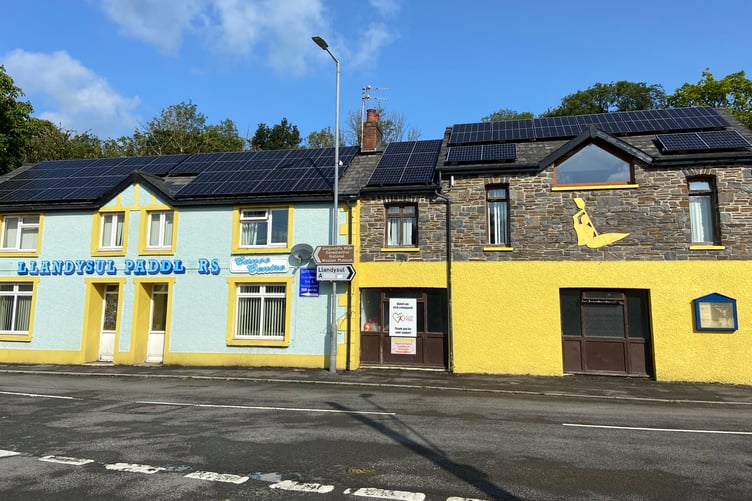IT seems a long time ago that Wales received substantial European Union funding but that ship has sailed and two replacement pots of cash are now being divvied up throughout the country.
One is called the UK Shared Prosperity Fund (SPF); the other is the Levelling Up Fund (LUF). They were both rolled out by the previous Conservative UK Government and there has been much debate about whether they’ve replaced the previous EU funding like-for-like, and how effective both EU and the new funding streams have been in making a difference.
Wales is getting £585 million of SPF money between 2022 and 2025. It bypasses the Welsh Government and goes to councils, which parcel it out to businesses and other organisations and use some of it themselves for projects.
The LUF, meanwhile, is a competitive fund. Councils bid for a share of it to deliver projects which must improve everyday life. Seventeen of Wales’ 22 local authorities successfully bid for £329 million of LUF money in the first two of three funding rounds, but bids totalling £754 million didn’t make the grade. The LUF runs until the end of the March 2025.
There are also replacement agricultural funding streams and a Europe-wide research and innovation scheme, which the UK has recently rejoined, but this article focuses on SPF and LUF and how Swansea and Carmarthenshire councils have benefited.
Last November Carmarthenshire Council published a report listing the scores of organisations that had applied for and been offered a share of £38 million of SPF money. It was a snapshot of the county’s economy – engineering firms, tourism operators, manufacturers, and food and drink businesses, plus rugby clubs, community councils and colleges. At the time the report was written £25 million of the £38 million had been allocated, with £5 million of it for an adult numeracy programme which all councils must support in their area.
Talking to organisations in Carmarthenshire and Swansea which have benefited shows just how much difference a few thousand pounds – sometimes more, sometimes less – can make.
Llandysul Paddlers, a canoeing club and centre in Llandysul, was spending huge amounts on energy bills. Keen to replace the centre’s heating oil system, it sought quotes for an air source heat pump and solar panels and successfully applied for just under £37,000 of SPF money to fund the majority of the work. Centre manager Gareth Bryant said a firm from nearby Newcastle Emlyn was brought on board and that the results looked promising.

“We think it’s going to save us £5,000 to £6,000 a year,” said Mr Bryant. “The air source heat pump seems to be working amazingly. We’ll be able to reinvest the savings and put on additional sessions.”
The group has five full-time staff, plus part-time employees, and takes schoolchildren and tourists kayaking and canoeing on the lake and the River Teifi. River swimming and other activities are also take place and Mr Bryant said around 20,000 people passed through the doors of the centre annually.
Llandovery Youth and Community Centre was awarded just under £79,000 of SPF money to refurbish its hall – a former Church in Wales meeting house. The Market Square building is now much more flexible and workable, according to centre manager Jill Tatman. “We were desperately short of storage space so we’ve had lots of units built in, and generally upgraded it,” she said. “It’s refreshed the whole building and brought it more into the 21st Century. It has become a ‘go-to’ place in the town.”
The centre runs after-school and youth clubs, workshops and a drop-in facility, and other groups run events there. It has two full-timers, 10 freelance workers plus around 40 volunteers. Mrs Tatman added: “We’ve just found out we’ve got three years of National Lottery funding, and I’m sure the work we’ve had done here helped our application.”
Llanedi Community Council took over the former Hendy Cricket Club building after the club folded around a decade ago and has recently brought it back to life in a £1.1 million project. Canolfan Gwili, as it’s known, has a main hall, two conference rooms and a cafe – Cegin Beca – and an official launch event takes place on Saturday September 14. The community council was awarded just over £123,000 of SPF money towards the project.
David Davies, the council’s clerk said: “This (SPF money) was invaluable to ensure the project could go ahead.” Centre manager Ashley Davies said the project had been a pleasure to be part of. “It wouldn’t have been what is without the help of the SPF grant,” she said. “It really has added the finishing touches to the building, allowing us to complete it with class and style – something that is regularly commented on by our fantastic community and customers.”
The Local Democracy Reporting Service asked Swansea Council, which has been publicising SPF grants, for a similar list of organisations which have benefited. It said it had awarded nearly £22 million of funding thus far to hundreds of projects although the list only mentioned 49 schemes.
Morriston-based Vibe Youth CIC, which was set up in 2017 to support young people’s social, emotional and personal development, received a £50,000 SPF grant split over two years. “It was quite an in-depth application process,” said co-founder Jake Henry. “In our eyes it was a large amount of money. We are able to reach further now.”

The community interest company has an office where one-to-one and small group sessions take place, and it also runs events in schools. Mr Henry said it was about helping young people who’d had challenges in their life gain confidence, learn life skills and “understand the need to succeed”.
He said he and others involved in the enterprise, which has five full and part-time staff and three volunteers, drew on their own experiences. “I’m always quite open and share my story about my childhood, what I got up to in my teenage years and how that led to a negative outcome,” he said. “I would say I was at the toughest end of society, but that hasn’t restricted me from succeeding. I’m not being over-confident but I feel that we have a way of making young people comfortable about wanting to share what they’re experiencing.”
Mr Henry said there was unease about how comprehensively SPF had replaced one of the former strands of EU funding which used to benefit third sector groups like his, and that this would mean greater competition for a share of it. He added: “From our perspective to get SPF funding was a big deal.”
Women’s fashion shop Solo by Helen needed a computer system when Helen Bowden took it over last September, and the Mumbles business now has a website and social media presence, thanks to £5,000 SPF grant. She said: “It wasn’t too difficult to apply, and the people at the council at the other end of the phone were really helpful. I had to put in £5,000 myself as well.” She added: “I’ve now got a new member of staff.”
Homelessness charity The Wallich received SPF money to run 15-week courses in Swansea and elsewhere in South Wales aimed at steering people towards training, volunteering and employment. Two groups have gone through the programme, which culminated with graduation-style events. One participant from Ammanford, Carmarthenshire, said his father had died in a motorbike accident and that his mother passed away a year later. “This led to my life taken a downward spiral of drugs and alcohol,” he said. A complaint at his workplace then led to a psychological assessment. The Wallich course, he said, had prompted him to apply for a training course. “This is the best I’ve been for three years,” he said.
A spokeswoman for The Wallich said the SPF money had filled the void left by the ending of EU support. Asked if the charity maintained contact with the people who’d gone through the courses, she said: “We will try and keep in touch and make sure there is continued support.”
Sometimes only a few hundred pounds can make a difference. Swansea marketing firm, The Cusp Marketing, received £750 SPF money to fund half the cost of a new website. “Since receiving the grant we’ve experienced a year of growth, securing over 20 new clients and reaching six-figure revenue,” said co-founder Louise Rengozzi. She added that the council had been very supportive and that the company, which hosts a podcast for Welsh entrepreneurs and other guest speakers, has now applied for a larger growth grant.
Others to have benefited in Swansea include an otter and water vole restoration project at Penllergare Valley Woods, Penllergaer, plus Surf Therapy, immersive technology and virtual reality business Imersifi, Cwtsh Hostel in the city centre, Swansea Market stall Bowla – a Bowl with a Roll, a natural products project called BioHUB run by Swansea University, and a major revamp at Morriston’s Tabernacle Chapel.
Who can apply for SPF funding and what scrutiny takes place?
The SPF fund has different elements and criteria. Any legally constituted organisation can apply for SPF funding, said a Swansea Council spokesman. Organisations located or registered outside the area were eligible to apply, he said, but the project itself delivery must take place within it.
The spokesman said council SPF officers undertook a detailed assessment of the projects prior to awarding funding, which was then moderated by a second team. He added: “After an award, ongoing monitoring of performance is carried out through quarterly returns managed by the SPF officers.”
What about the Levelling Up Fund?
Carmarthenshire Council has successfully bid for £16.7 million towards the long-awaited Towy Valley cycle path between Carmarthen and Llandeilo, and a share of £19.9 million to create a town centre hub at the former Debenhams store in Carmarthen – the other new hub is in Pembroke. The council has also secured £15.5 million to bring Llanelli’s former Woolworths store back into productive use and to improve the look of the town’s Central Square, Spring Gardens and Cowell Street.
Swansea Council has been awarded £20 million of LUF money to continue the restoration of the Hafod-Morfa Copperworks area, improve River Tawe links between Morfa and the city centre, and upgrade Swansea Museum with a new cafe, and exhibition and gallery spaces.

What do politicians in Wales think of SPF and LUF?
This has been the subject of much research and debate. The Welsh Government has argued that Wales will get £772 million less between 2021 and 2025 than it would have received via the EU. The previous UK Government disagreed.
Senedd committees have examined the numbers, and recommendations were made by the economy, trade and rural affairs committee last September. Interestingly, a Sheffield-based economist called Professor Steve Fothergill told the committee he believed both Governments were right because “they’re talking about rather different things”. Committee members couldn’t come to a settled position as to which side had a stronger argument.
The committee also heard from people who said SPF money benefited West Wales and the Valleys less than EU cash, and that this in turn had shifted funding to East Wales. Concerns were raised by some about the lack of a role for the Welsh Government in terms of SPF and LUF, arguing that it could lead to a duplication of funding programmes.
Some organisations told the committee that councils were prioritising their own projects, and there were claims that some local authorities were using some of the funding to cover budget shortfalls. Some of the strongest criticism about the post-Brexit funding landscape came from universities, which used to benefit from a pot of EU cash called the European Social Investment Fund.
Senedd members also heard that putting LUF bids together was time-consuming for councils, and that there didn’t seem to be any over-arching strategy to them. However, it was also said that individual projects would be visible to people and make a difference. One organisation, the Institute for Welsh Affairs, argued that councils should have had access to LUF money for capital investment rather than having to bid for it competitively.
Professor Gareth Davies, of Swansea University’s school of management, told the Local Democracy Reporting Service his analysis was that Wales was getting a lot less post-EU than pre-EU funding, and that this factored in the rather messy financial settlement agreed by the UK and EU. He said the UK economy had also lost out as a result of Brexit.
“There is always the question of how well EU money was spent,” said Prof Davies. It was difficult, he said, to come to a conclusion. He added that likely, large-scale job losses in the steel industry at Port Talbot was a worry for the Welsh economy, and that several UK regions remained weak productivity-wise. “Take out the city of London and some manufacturing in the West Midlands and it’s not a strong story,” he said.
The Labour UK Government said decisions on SPF funding beyond 2025 were for a future budget or other fiscal announcement, and that it was also aware that councils wanted clarification on the LUF scheme. “The Government will set out further details on this matter in due course,” a spokesman said.
The Welsh Government said all previous EU funding programmes were over. A spokeswoman said: “The Welsh Government is looking forward to discussing post-March 2025 funding arrangements with the new UK Government as the Shared Prosperity Fund begins to wind down.”




